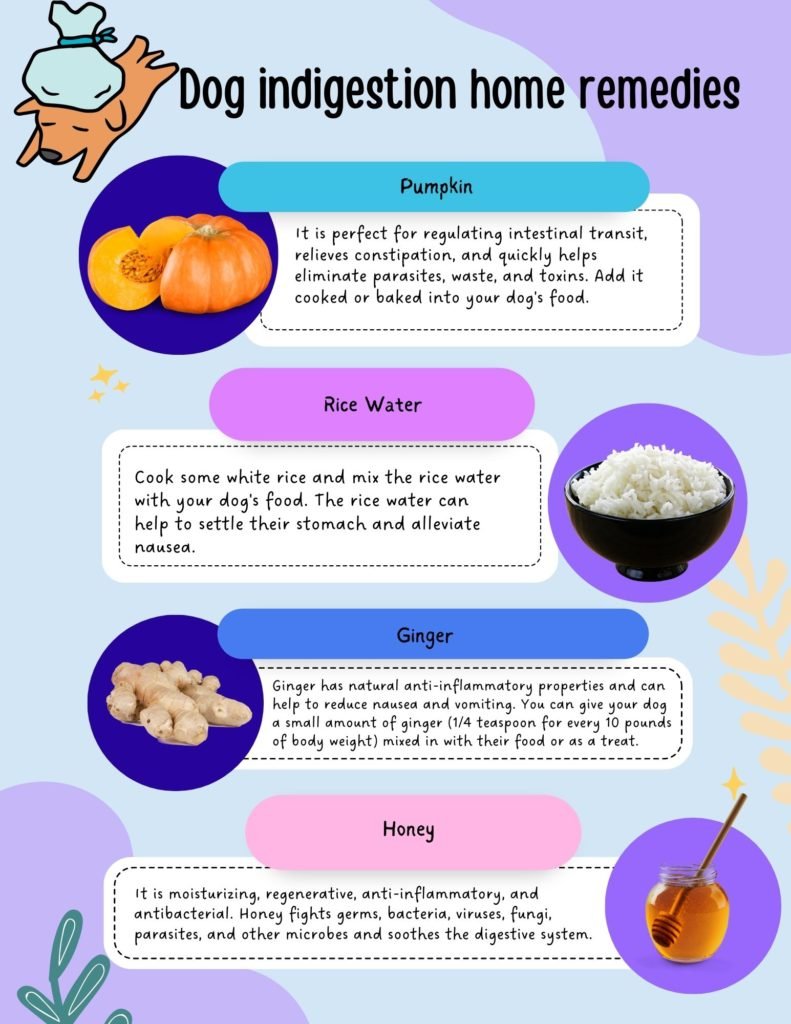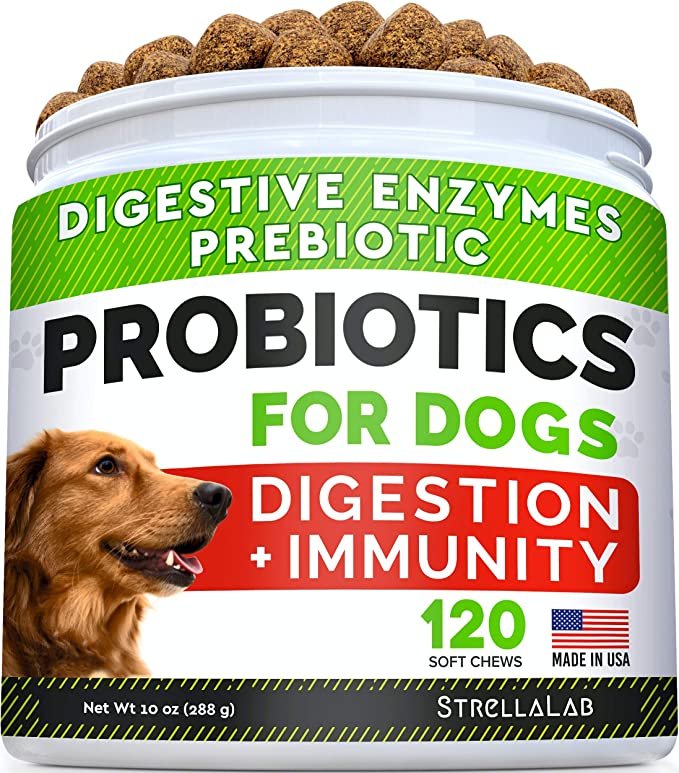Indigestion in dogs, often known as gastrointestinal distress, is when a dog has difficulty digesting food This article will address the common causes of dyspepsia in dogs, how it’s diagnosed, and the possible treatment choices.
Symptoms of Indigestion in Dogs
If your dog is experiencing indigestion, you may notice one or more of the following symptoms:
- Vomiting
- Diarrhea
- Loss of appetite
- Bloating or abdominal discomfort
- Belching or gas
- Bad breath
It’s important to note that other health issues can also cause these symptoms, so if your dog is experiencing them, it’s always a good idea to consult your veterinarian.
You may also interest: Tick on Dogs: Protect Your Dog from These Bloodsucking Parasites
Causes of Indigestion in Dogs
There are several possible causes of indigestion in dogs. Some common ones include:
Too much or too fast eating
Dogs, especially those prone to begging or scavenging, may consume more than their body can comfortably handle. This can lead to indigestion.
Consumption of unhealthy or undigested foods
Dogs are known for being curious and sometimes ingesting things they shouldn’t. Indigestible items like bones, sticks, or trash can cause gastrointestinal upset.
Eating spoiled or contaminated food
Food that has gone bad or has been contaminated with bacteria can cause indigestion in dogs.
Sensitivity or intolerance to certain types of food
Just like people, dogs can have food allergies or sensitivities that cause digestive issues.
Medical conditions such as pancreatitis or inflammatory bowel disease
These and other medical conditions can cause indigestion in dogs.
You may also interest: Deworming your Dog: A Comprehensive Guide
Diagnosing Indigestion in Dogs
If your dog is showing symptoms of indigestion, your veterinarian will start by performing a physical examination. They may also recommend one or more of the following tests to help diagnose the cause of indigestion:
- Blood work can help rule out other potential causes of your dog’s symptoms, such as liver or kidney disease.
- X-rays can reveal any foreign objects or abnormalities in your dog’s digestive system.
- Endoscopy: This procedure involves inserting a small camera into your dog’s digestive tract to get a closer look at the inside.
Indegestion in Puppies
Indigestion in puppies is usually caused by eating too much or too fast, ingesting spoiled food, or having an intestinal parasite. In adult dogs, pancreatitis, inflammatory bowel disease, and stomach ulcers can cause indigestion.
Dyspepsia in puppies and adults can include vomiting, diarrhea, gastrointestinal pain, loss of appetite, and lethargy. The severity and duration of these symptoms vary on the cause.
The cause determines dyspepsia treatment in puppies and adults. Indigestion may heal itself or require treatment. The vet may advise feeding adjustments, anti-nausea, anti-diarrheal, and other treatments.
You may also interest: Don’t Ignore Your Dog’s Dental Health: Here’s How to Clean Their Teeth
Treating Indigestion in Dogs
The treatment for indigestion in dogs will depend on the underlying cause. In general, treatment may involve one or more of the following:
- Resting the digestive system: This may involve withholding food and water to give your dog’s digestive system a chance to rest. Your veterinarian will let you know how long this should be.
- Administering medications: Your veterinarian may prescribe medications to alleviate your dog’s symptoms and treat the underlying cause of indigestion.
- Making dietary changes: If your dog has a food allergy or intolerance, your veterinarian may recommend switching to a different type of food.
- Surgery: In severe cases, surgery may be necessary to remove foreign objects or repair damage to the digestive system.
Preventing Indigestion in Dogs
There are a few steps you can take to help prevent indigestion in your dog:
- Feeding a balanced and appropriate diet: Make sure your dog is getting the right amount and type of food for their age, size, and activity level. Consult with your veterinarian or a canine nutritionist if you have questions.
- Monitoring food and water quality: Give your dog fresh, clean food and water. Avoid leaving food out for extended periods, as it can spoil or become contaminated.
- Preventing access to inappropriate or indigestible items: Keep an eye on your dog when they are outside and remove any potential hazards from their environment.
- Managing medical conditions: If your dog has a medical condition that puts them at risk for indigestion, follow your veterinarian’s treatment plan to help prevent flare-ups.
Dog indigestion home remedies

There are a few home remedies that you can try to help alleviate indigestion in your dog. However, it is essential to remember that indigestion can be severe. The best option is to consult a veterinarian if you doubt your dog is suffering from indigestion.
Pumpkin
It is perfect for regulating intestinal transit, relieves constipation, and quickly helps eliminate parasites, waste, and toxins. Add it cooked or baked into your dog’s food.
Rice water
Cook some white rice and mix the rice water with your dog’s food. The rice water can help to settle their stomach and alleviate nausea.
Ginger
Ginger has natural anti-inflammatory properties and can help to reduce nausea and vomiting. You can give your dog a small amount of ginger (1/4 teaspoon for every 10 pounds of body weight) mixed in with their food or as a treat.
Honey
It is moisturizing, regenerative, anti-inflammatory, and antibacterial. Honey fights germs, bacteria, viruses, fungi, parasites, and other microbes and soothes the digestive system.
Probiotics
Probiotics can help to repair the balance of good bacteria in the digestive system and may help to alleviate indigestion. You can give your dog probiotics as a supplement or add fermented foods to their diet.
It’s important to remember that these at-home remedies shouldn’t replace visits to the vet but rather complement their services. You must speak with a veterinarian for proper treatment if your dog’s symptoms do not improve or have severe indigestion.
In conclusion, indigestion in dogs can be caused by various factors, ranging from eating habits to medical conditions. If you suspect your dog may be experiencing indigestion, you must consult your veterinarian for an accurate diagnosis and appropriate treatment. By taking steps to prevent indigestion and following your veterinarian’s recommendations, you can help keep your furry friend happy and healthy.



